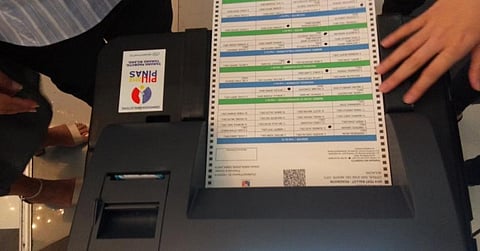
- NEWS
- the EDIT
- COMMENTARY
- BUSINESS
- LIFE
- SHOW
- ACTION
- GLOBAL GOALS
- SNAPS
- DYARYO TIRADA
- MORE

While the Commission on Elections (Comelec) indicated its determination on Wednesday to push through with internet voting as part of the reforms in next year’s polls, a petition before the Supreme Court seeks the comeback of the old Smartmatic vote counting machines (VCMs).
The Comelec said online voting will be the primary mode for casting ballots for overseas Filipinos in the 2025 national and local elections, except in countries with internet restrictions.
However, the High Tribunal was petitioned by former Caloocan representative Edgar Erice to direct the Comelec to continue using the 97,000 VCMs in the 2025 national and local elections.
Erice’s petition was part of a supplement to the certiorari he filed last month seeking to annul the P18-billion contract between Comelec and South Korean provider Miru Systems for a new automated election package.
Maximize public funds
“It borders on absurdity why Comelec needed to conduct a bidding for the lease of vote-counting machines and other election-related paraphernalia when it already made a prior purchase of the very same items for which the bidding was conducted,” Erice said.
The former Caloocan solon pointed out the poll body has a standing service contract with Smartmatic, which includes a warranty for free replacement parts, ensuring the continued functionality of the machines in multiple elections.
“In support of the President’s call for fiscal prudence, Comelec might want to reuse the VCMs it already owns, thereby saving the taxpayers at least P8 billion,” Erice noted.
After analyzing the Comelec’s Terms of Reference (ToR), Erice said that 95 percent of the required functionalities are already satisfied by the existing VCMs, particularly in their Optical Mark Reader (OMR) function. He explained that in the 2025 national and local elections (NLE), only the OMR function of the VCMs will be utilized.
“Our study of the Comelec’s ToR shows that the existing VCMs already satisfy 184 of the 194 requirements for OMR,” Erice said, adding that the remaining five percent “still needs further study but none of this is related to the accuracy of results.”
Arbitrary deal award
The poll body was accused by Erice of committing grave abuse of discretion when it “whimsically and arbitrarily” awarded the contract to the Miru joint venture despite the provider’s failure to demonstrate its system’s capability and prior use in violation of the Election Automation Law and Comelec’s own ToR.
“Unlike Miru’s technology, the VCMs owned by Comelec have a proven track record, successfully facilitating three national elections. We shouldn’t risk the integrity of the 2025 elections by abandoning a tested and reliable system,” Erice said.
Erice lamented Comelec’s failure to consult its advisory council before issuing the ToR, as required by law.
He questioned the bidding process, pointing to its lack of transparency and accountability.
Erice’s petition is aimed at ensuring the integrity and efficiency of the electoral process. It hoped the High Court would act promptly on the issue because the question at hand is very straightforward — whether the Miru system and machine is a prototype.
“It is not rocket science to determine it,” the petition said.
SC hits Comelec
Earlier, the SC ruled that the Comelec committed grave abuse of discretion when it disqualified service provider Smartmatic from bidding for the 2025 poll project.
It said the Comelec implemented a “discretionary pre-qualification regime” that was “antithetical” to the government’s bidding process.
“While the SC acknowledged the power of the Comelec to run elections, the Comelec itself did not comply with its own procedures in its bidding and awards committee, which was antithetical to the appropriations law that applied,” SC spokesperson Camille Sue Mae Ting told reporters in Baguio City.
However, the SC noted in its ruling that its finding was not enough to nullify the public bidding or award of the contract to Miru Systems.
The High Court cited considerations of equity, justice, practicality and the doctrine of operative fact when it arrived at its decision.
“This means that the law produced consequences that cannot always be ignored or disregarded. It nullifies the law but sustains its effect. It is only resorted to as a matter of equity and fair play,” the SC said.
Serious backlash
Meanwhile, Comelec chairperson George Erwin Garcia said, “We weighed all the implications, all the things that could happen, and it is necessary for us to continue with internet voting because our resolution that says that there can be internet voting even without a law. No one is questioning it in the Supreme Court.”
“In our opinion, the consequences will be more serious if we deliberately do not continue with the internet voting that is expected by our compatriots abroad,” Garcia added.
Senate Minority Leader Aquilino Pimentel III, however, said that a law is needed to implement the P465.8-million online voting and counting system in next year’s polls.
Last year, the Comelec approved the use of the internet as an alternative mode of voting for overseas Filipinos.
The Comelec earlier said the move would save the poll body hundreds of millions of pesos since it would no longer have to ship voting machines to many countries. This also aims to improve voter turnout among overseas Filipinos.
“Through internet voting, we hope our cost will decrease and, at the same time, the number of voters will increase,” Garcia said.
In the 2022 elections, Comelec saw a 38-percent turnout abroad, or of only 600,000 of the nearly 1.7-million registered voters.
